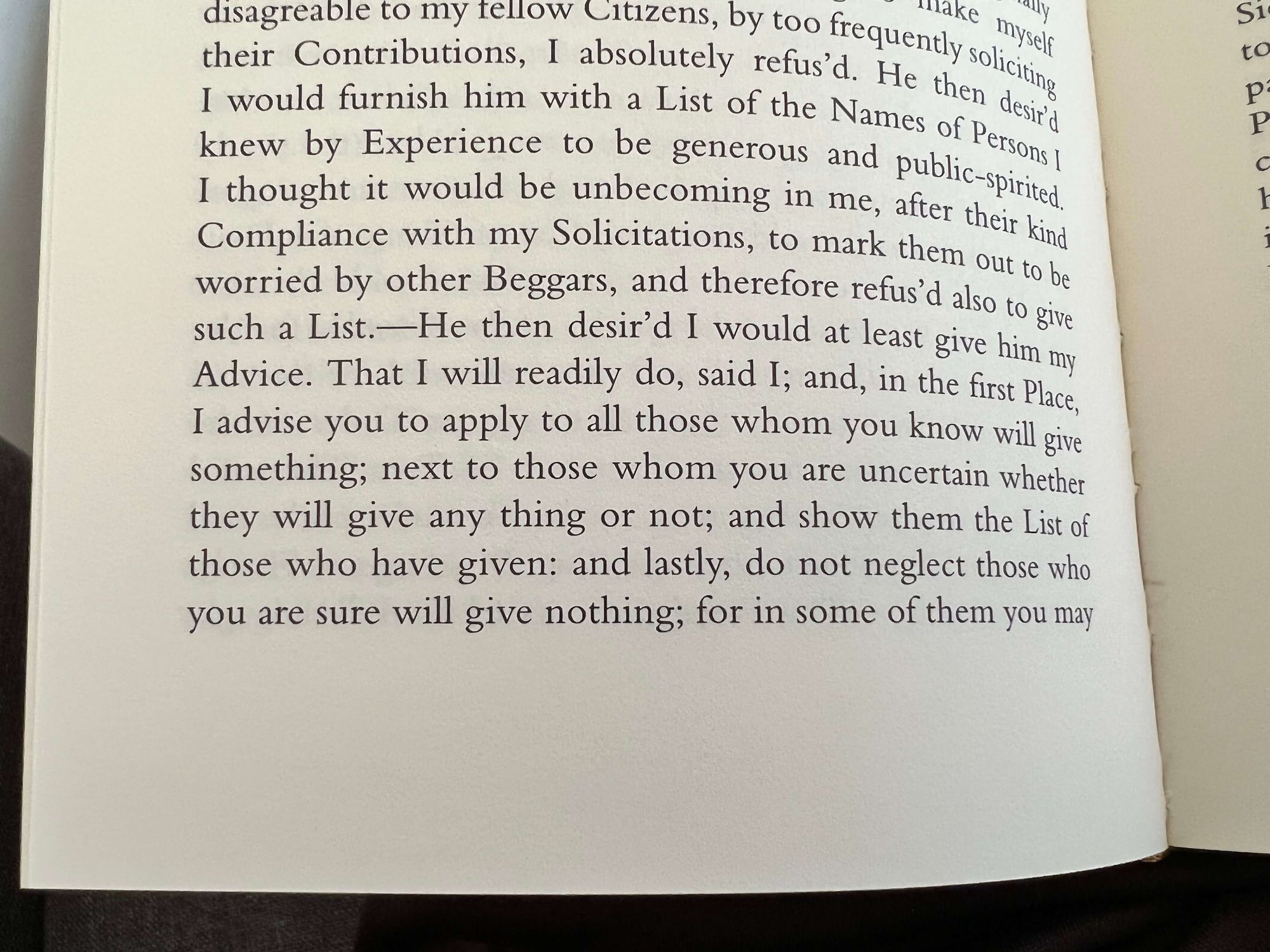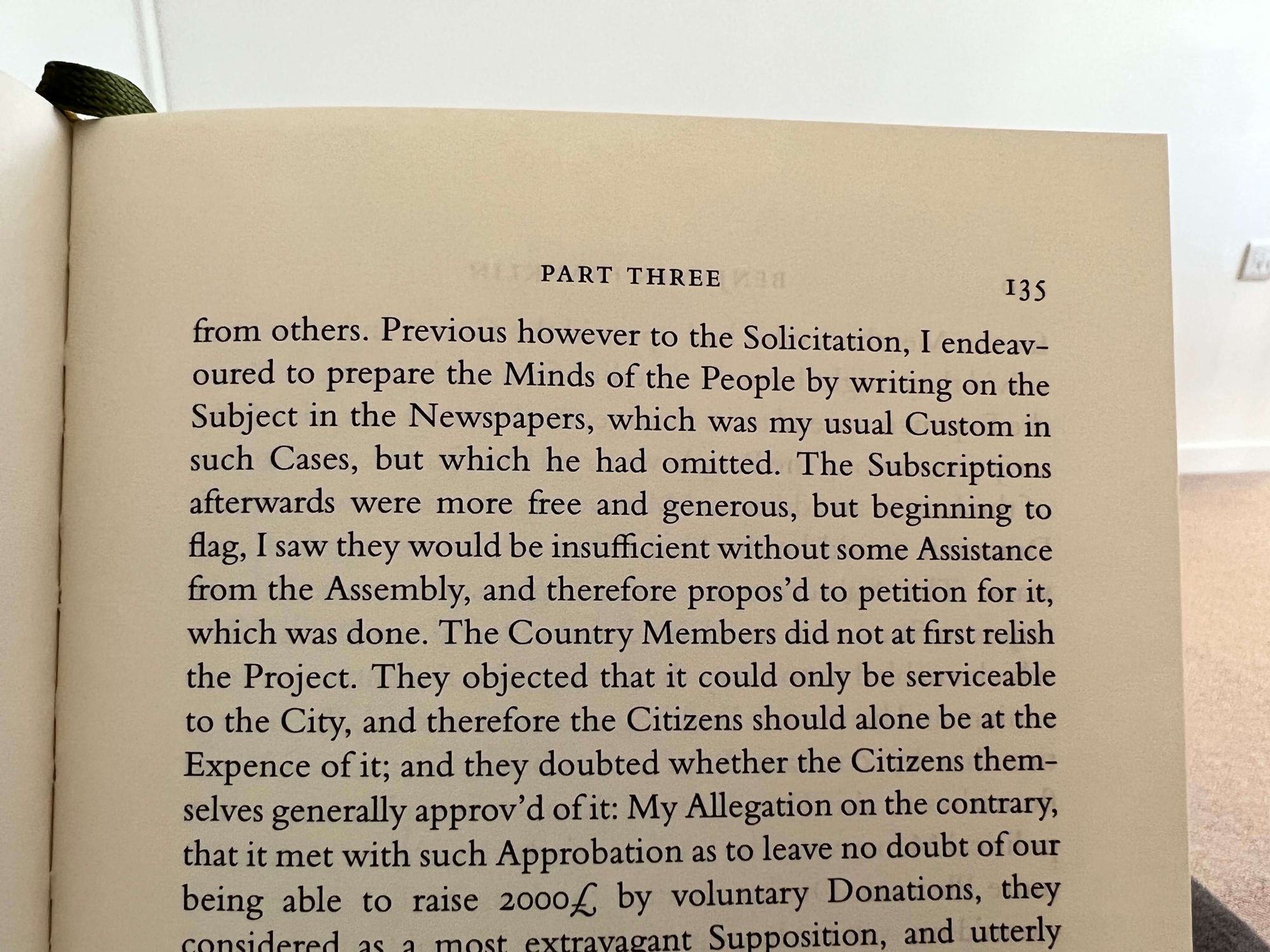Reflections on Franklin’s autobiography
My thoughts on how to improve my life, inspired by Franklin’s autobiography. Should be valuable for anyone seeking self-improvement.

Two weeks ago, I finished reading Franklin’s autobiography. It made such an impression on me that I had to sit down and do some self-reflection. When I looked at what I wrote, I realized that other young, ambitious, and curious people might benefit from reading it. Hence this post.
Reflections
- Just like him, I need to study a lot to compensate for my lack of education. [Even though I went to university and got a degree in Management on Information Systems, I didn’t really attend the classes as they were rather dull, and I desperately needed to make money. I built projects and businesses instead.] Evening and weekends must be devoted to this. I should still go for hikes and travel to other cities on Sundays, though, [I live in London] just not every week.
- In the 18th century, people were thirsty for information and knowledge, not drowning in it, as we are today. This scarcity of good knowledge made them very happy with the books they somehow managed to acquire and improved their understanding, for they were actually reading them instead of jumping from one exciting “smart thinking” bestseller summary on Blinklist to another, as we do. Practically, I should try to reduce the number of “injections” of new information throughout the day (e.g., yesterday’s Hacker News browsing experience that made me nervous), group them, and focus more on long-form literature/content instead, just occasionally bombarding my mind with sources like HN and Twitter. (Intuitively, I sense there’s something very, very wrong about this constant dripping of new, low-quality, often opinionated information into my mind.)
- Franklin’s writing skills paid off millionfold throughout his life in the form of jobs for his printing business, fans, friends, acquaintances, colleagues, venture partners, fundraising, politics, and reputation. Hone and apply mine! At the same time, don’t forget that nowadays we have different (and perhaps in some aspects better) media such as images and video; leverage it as well.
- [On ambitions and long-term plans] He wasn’t desperately trying to plan out how he’d become a president of the US when he was 20 years old! It would be impossible to do because the US could’ve never happened! What he was doing, though, was being very industrious, virtuous, and studying a lot, whenever he had a moment, and then taking advantage of opportunities as they presented themselves. (This is somewhat similar to what Cal Newport talks about in his book So Good They Can’t Ignore You.) Instead of trying to figure out a perfect strategy, I should focus on doing my thing well, excelling in it, and then expanding as opportunities present themselves, having already developed skills, knowledge, and reputation, and acquired resources by that time.
- Another thing that startled me is how much general life knowledge and wisdom people already had in the 18th century (and perhaps centuries before that). It feels like they were the guys who killed the mammoth, and we are the guys who tear the poor beast apart piece by piece, bring those tiny strips and bones to the camp, and proudly beat ourselves into the chest that we’ve found meat, while the fucking mammoth had already been killed by great men hundreds of years ago! Habits/virtues are a good example. Franklin’s 3-page long description of his plan to achieve moral perfection is the mammoth, and thousands of habit-building, life-changing, mood-improving books on the market are the strips (at best). Another example is his schedule and suggestions like “have a light breakfast as it keeps your head clearer for work.” How many books on schedule are out there? Hundreds? Thousands?
Why do so many people, like hyenas, tear that poor mammoth apart instead of finding a new beast to kill? Probably because it’s easier. Another reason might be that our globalized and interconnected world enables niche markets and easy distribution to them; the markets who’ve never heard of the mammoth and will gladly catch the bone. Still, it’s shocking how widespread this pattern is. (Incidentally, the same thing is happening in business and startups: just look at all the food delivery companies that keep popping up like mushrooms after the summer rain. Peter Thiel describes it very well in Zero to One and his Stanford lecture on competition.) - Another thing that caught my attention was his club, Junto. I definitely want something like that! I think having such an environment is extremely stimulating to my growth as a person and also very useful for my work, as I can get advice/cooperate/etc. Especially since I work from home! It’s a good question whether such a club should include only founders or involve intellectually curious people from all walks of life. Probably the latter makes more sense as any system benefits from the diversity of its parts, especially teams/communities built on the premise of specialization. [If you’d like to join such a thing, email me at vasilishynkarenka@gmail.com and I’ll think how to set it up.]
- His work ethic is also worth a note. While most people were spending their evenings in the tavern (in 2022, this would be Netflix), he was studying and/or working on his printing business. He rose early, ate lightly, helped many people, and always delivered, which was noticed by other people who then entrusted him with their business or money. (This wouldn’t work if he didn’t deliver on his promises, though, which is something I need to work on: being very ambitious and optimistic, I often promise too much and don’t deliver all of it.)
- Speaking of Netflix, I realized that Netflix is the new tavern/pub. All those people binging it (myself up until mid Jun 2022 included), entertaining themselves instead of exerting their minds towards a productive purpose, would be frequent tavern/coffee house visitors if they lived a couple hundred years earlier. The trouble is that Netflix is waaaay more appealing to introverts as they don’t have to interact with strangers, less risky (you can easily get your ass kicked at the pub), and less demanding physically, so my guess is that many of those Junto members would frequent it instead of studying/doing something productive if they lived in 2022. This makes me very sad as neither I nor anyone else in the world will benefit from this pastime of theirs in any way whatsoever.
- Another thing I realized is that reading biographies of great men is an even better (or maybe complementary) way to train my models than fiction movies and books, because the people described in biographies actually lived and acted in this world, whereas fiction heroes are often unrealistic. From now on, and especially after I read more about him, I’ll be able to ask myself: “What would Franklin do? and generate interesting action ideas based on my knowledge of his behavior.
- Humility is a trait that I need to grow in myself. I noticed that he (probably being of old age already) wrote very openly about his failures, and that this openness actually made me trust him more instead of despising him for being stupid/not virtuous/etc., which is what I thought would happen if I open up the dark closet of my own failures to the world. In addition to that, humility in conversation is absolutely something I need to work on. Shutting up, listening, and not correcting every other thing that people say will most certainly lead to having better chats and relationships with others, as it did for him.
Illuminating moments
Mental health

Entrepreneurship
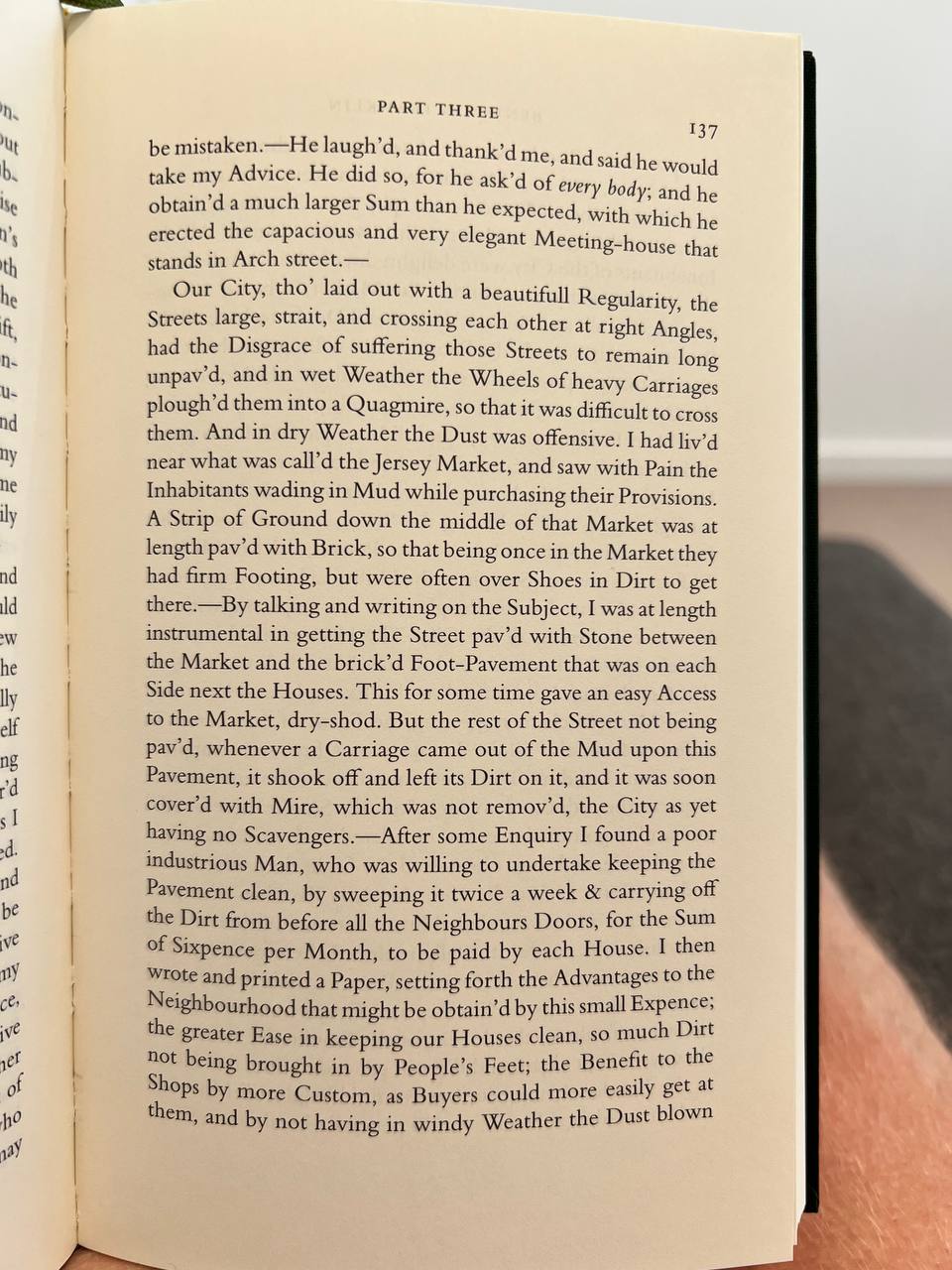
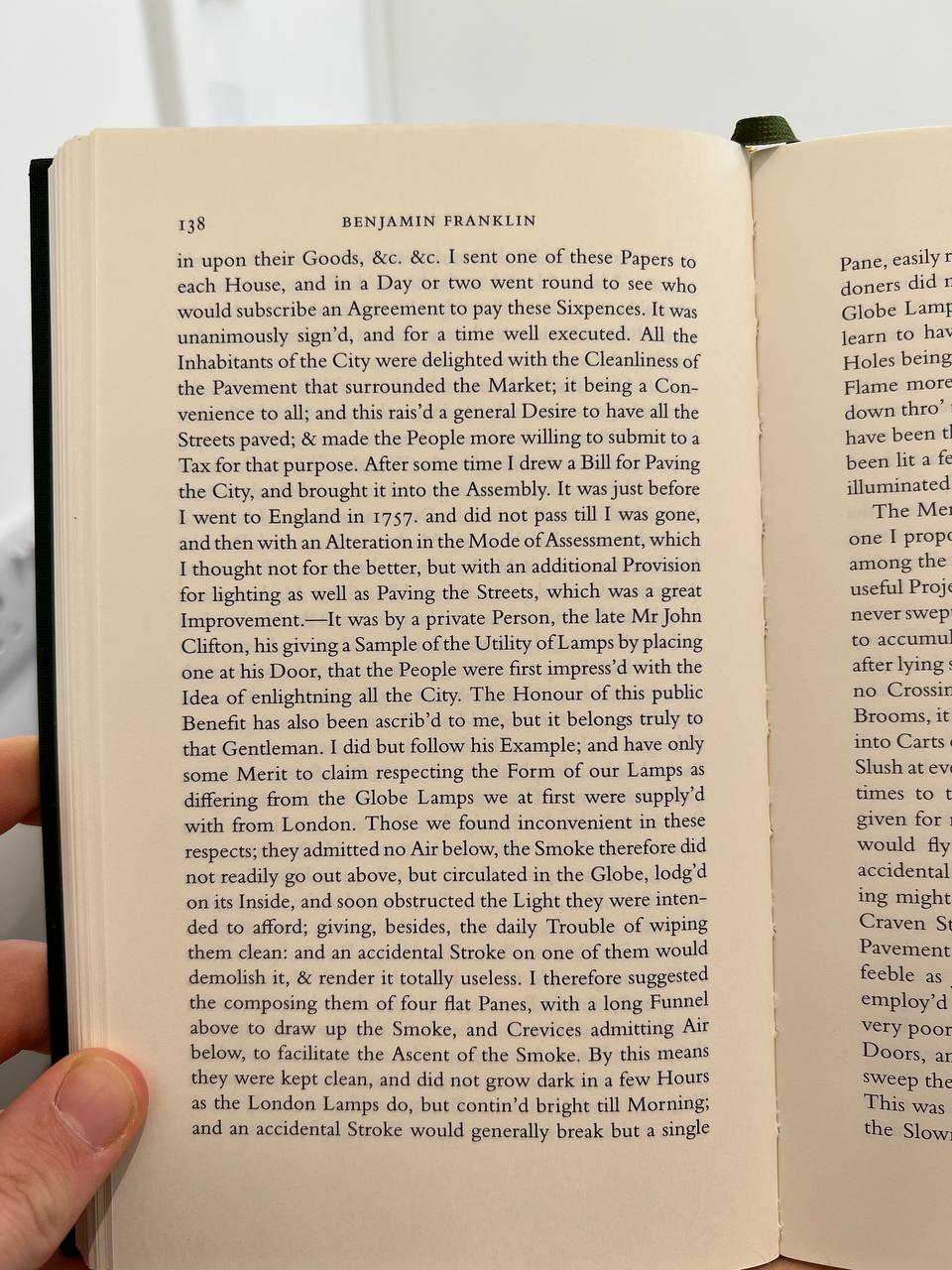
Sales
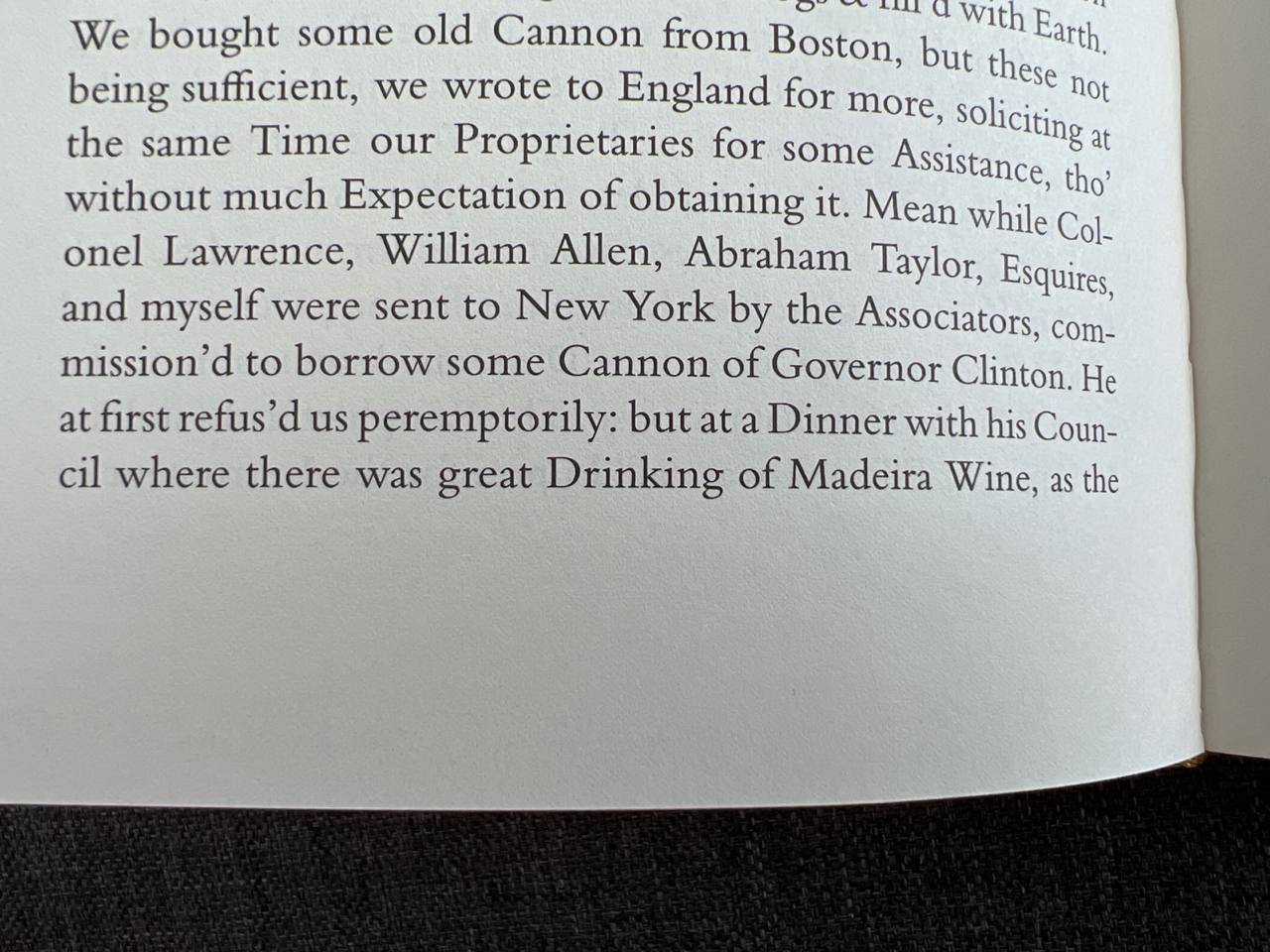
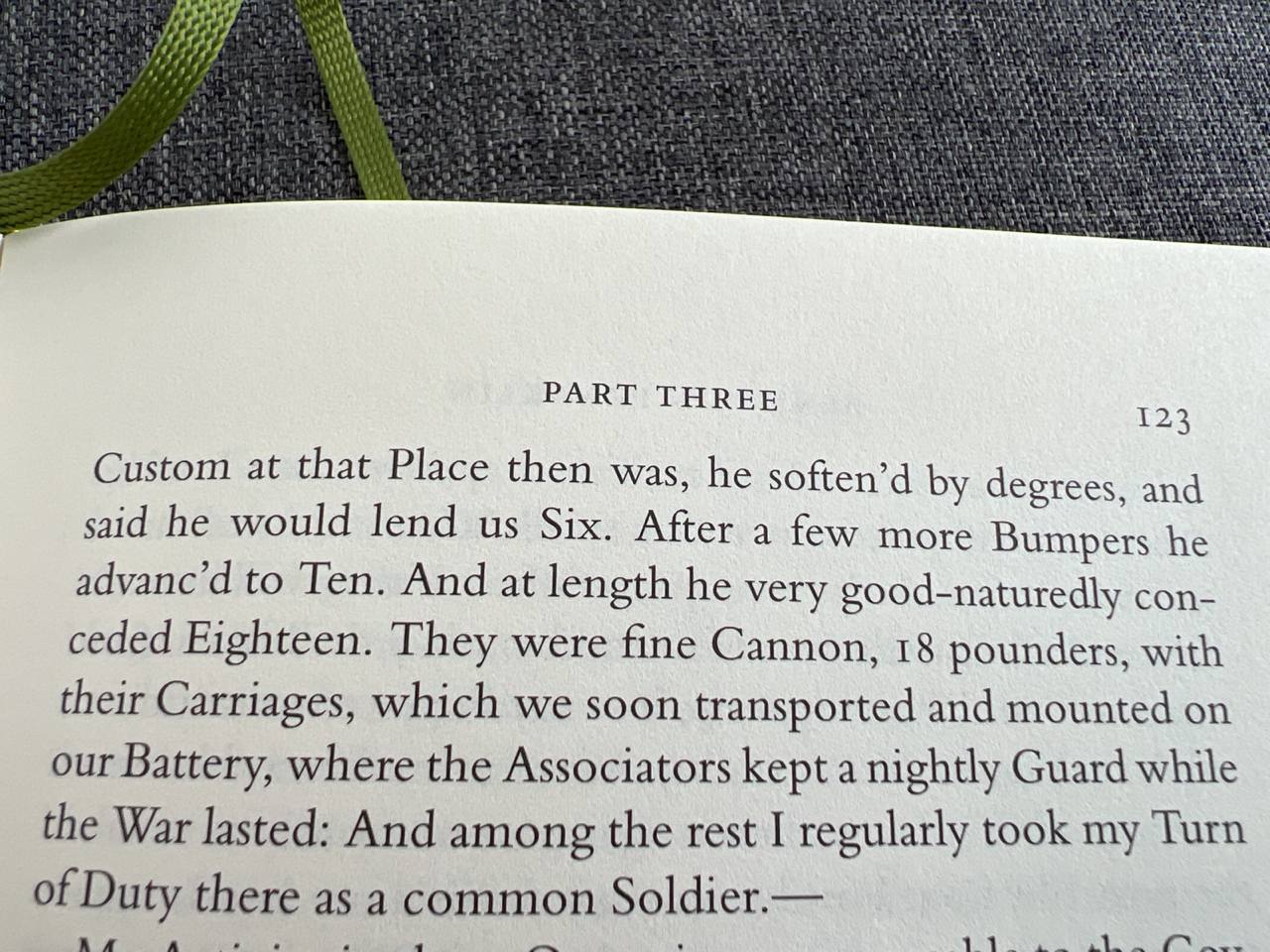
Fundraising
